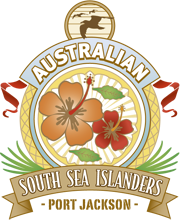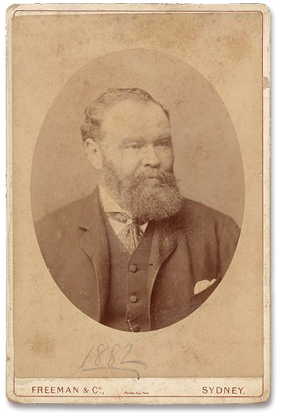This weekend Australian South Sea Islanders are holding WANTOK in Mackay, the last of three national workshops aimed at bringing together the diverse Islander community. The first of their ancestor were brought to Mackay in 1867, just a few years after the founding of the settlement in 1860.
What few Mackay residents realise is that John Mackay, a leading member of John Macrossan’s 1860 expedition which “discovered” the Pioneer Valley, went on to work in the labour trade and that Mackay, the city, owes its name to a Blackbirder.
Born in 1839, as a young man John Mackay was involved in mining, exploration and pastoral ventures. He stocked Greenmount run in the valley but had to sell out in 1863. Mackay had previously served on one Pacific voyage as a purser while still in his teens, which led him to gain his master’s certificate in 1865 and for the next eighteen years he commanded various ships in the Pacific trade. A Captain of several vessels recruiting Melanesian labourers, one was Sir Isaac Newton in 1868 on a voyage bringing Melanesian labourers to Gladstone. Records also suggest that he was twice master and recruiter on Queensland vessel the Flora in 1875.
He was also on another voyage, either that of the Daphne or the Carl, and was master of Waiau in the Fiji labour trade. John Mackay also spent some years in Fiji on a sugar plantation before becoming harbour master in Cooktown (1892-1902).
Back in 1978 and 1979 when this labour trade connection was aired in the pages of the Daily Mercury, his granddaughter Margaret Mackay defended what the family believed to be the honour of John Mackay (D.M. 25-4-1979). A trip, thought to be on the Daphne, was discussed. The 1868 Australian Daphne  voyage is well known because of a NSW Royal Commission and there is no evidence that John Mackay on this voyage.
The Mackay family has correspondence from Archibald Watson, later a professor of anatomy in Adelaide, who worked as crew on the Carl in 1871-72. In 1914 Watson wrote to John Mackay saying that had he not used the ship’s guns, the vessel would certainly have been taken and all on board killed. To avoid prosecution, Watson left for Europe straight after the Carl voyage. The Carl made two voyages recruiting for Fiji. The first was the most horrific voyage in the Melanesian labour trade. Fifty Islander recruits were shot and about twenty were wounded on the ill-fated voyage. Was John Mackay on board, and if not when did he turn a ship’s guns on Islanders?
John Mackay was badly treated by the Queensland government. In 1864 the Governor had promised to give him a financial recompense for his part in discovering the Pioneer Valley, but the government never honoured this pledge. John Mackay protested this on several occasions, and this is probably why in later years he presented himself as leader of the 1860 expedition. Evidence from the Macrossan family suggests that John Macrossan was the real leader.
As chairman of the Queensland Marine Board (1902-12) and finally harbour master of Brisbane until his death in 1914 he became a venerable figure, held in high regard, but in the 1860s and 1870s he was a young man seeking his fortune on land and at sea.
The 1860s Queensland labour trade was confined to the New Hebrides (Vanuatu) and the Loyalty Islands (now in New Caledonia). Historians believe that there was a great amount of deception and trickery involved and that kidnapping and violence was rife in the early years, although not universal. Many of the labour recruits from the Loyalty Islands and southern New Hebrides had already worked as crews on inter-island shipping.
The word Blackbirding is used to describe the early years of the labour trade. Even by his family’s admission, John Mackay was involved in at least one very violent incident, and there were official French protests over the Sir Isaac Newton voyage.
John Mackay deserves to be remembered as a 1860s explorer and pastoralist, but let us also remember that, similar to Robert Towns, founder of Townsville, his name is connected to the Blackbirding years.
Professor Clive Moore will be speaking at Wantok on Day 2 of the program Saturday the 29th March in his capacity as an advisor to the Australian south Sea Islanders (Port Jackson) historical panel in also sharing Mackay Births Deaths and Marriages Register as well as DATSIMA finding family record complimented with a Q&A.
For interviews call Professor Clive Moore mobile: 0419 676 123
University of Queensland
The complete WANTOK 2014 program can be downloaded HERE.
Photo courtesy of The National Library of Australia
John Mackay – Blackbirder Posted 27 March 2014.

